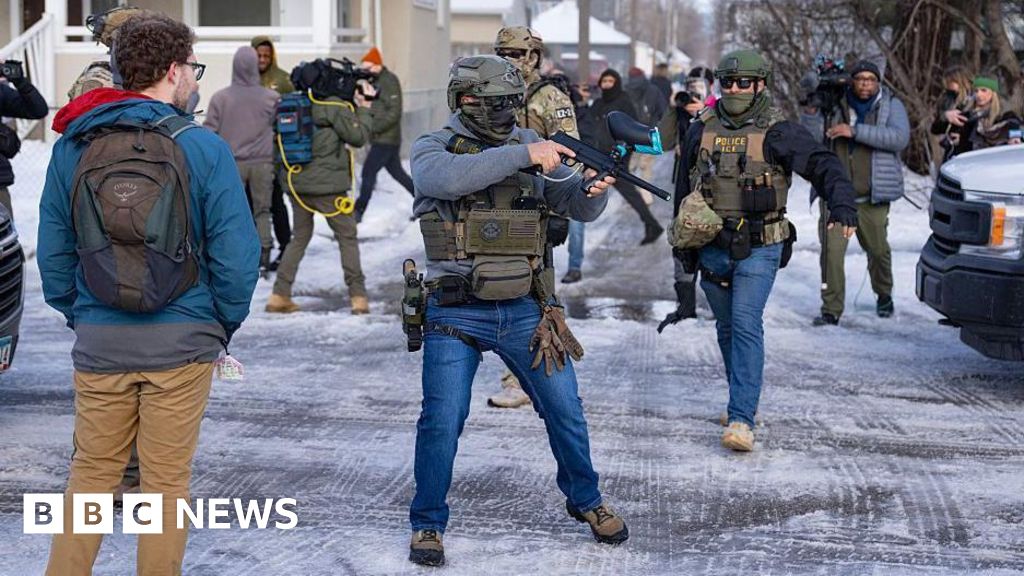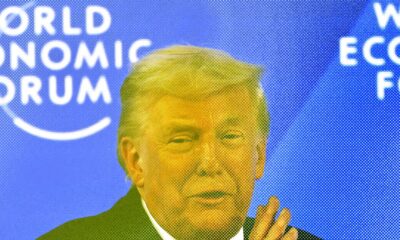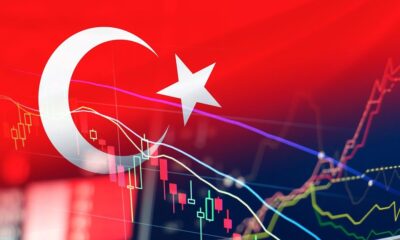Business
US government announces 10% stake in chipmaker Intel

 Getty Images
Getty ImagesUS Secretary of Commerce Howard Lutnick said on Friday that the federal government will take a 10% stake in US chipmaker Intel.
“This historic agreement strengthens US leadership in semiconductors, which will both grow our economy and help secure America’s technological edge,” Lutnick wrote on X in a post accompanied by a photo of himself with Intel CEO Lip-Bu Tan.
President Donald Trump revealed the deal earlier on Friday during remarks in the Oval Office, calling it a “great deal for them”.
Shares of the Santa Clara, California-based chipmaker soared more than 5% on Friday.
Intel said in a statement that the US government would make a $8.9bn (£6.6bn) investment in Intel common stock.
The funds were set to come from grants that were previously awarded but not yet paid, Intel said, including monies promised under the US CHIPS and Science Act which was passed during President Joe Biden’s administration.
“As the only semiconductor company that does leading-edge logic R&D and manufacturing in the US, Intel is deeply committed to ensuring the world’s most advanced technologies are American made,” Mr Tan said in a statement.
“President Trump’s focus on US chip manufacturing is driving historic investments in a vital industry that is integral to the country’s economic and national security,” he added.
The CHIPS Act was passed with the aim of reshoring chip manufacturing in the United States.
Intel has struggled in recent years to build out more chip capacity and has fallen far behind rival Nvidia whose market cap has soared past the $4tn mark while Intel’s has languished around $100bn.
The one-time Silicon Valley icon has failed to capitalise on the development of mobile technology and, more recently, artificial intelligence which Nvidia has dominated.
Under attack
Intel had found itself in US President Donald Trump’s crosshairs in recent weeks.
Earlier this month, Trump called on Mr Tan to immediately resign, accusing him of having problematic ties to China.
Trump called Mr Tan “highly conflicted” for alleged investments in companies which the US says are linked to the Chinese military.
Mr Tan referred to the accusations as “misinformation” in a note sent to Intel staff, in which he defended himself and said he had “always operated within the highest legal and ethical standards.”
Mr Tan is a US citizen born in Malaysia and raised in Singapore.
It is legal for Americans to invest in Chinese firms.
Trump’s attack came after Republican Senator Tom Cotton delivered a letter to Intel’s board raising similar concerns and questioning the company’s ability to be a “responsible steward of American taxpayer dollars and to comply with applicable security regulations”.
Mr Tan visited the White House to meet with Trump after the president’s attacks.
A ‘creative idea’
Friday’s announcement comes after White House Press Secretary Karoline Leavitt called the proposal “a creative idea that’s never been done before” earlier in the week.
The Trump administration recently ordered Nvidia and AMD to give the government a 15% cut of the revenue from AI chip sales to China, according to reports.
While the approach is considered unusual, Jacob Feldgoise, a Senior Data Research Analyst at Georgetown University’s Center for Security and Emerging Technology, drew parallels between the equity stake and the previous approach of giving Intel grant funding.
“It’s still in service of the same overall objective which is taking a more direct role in private markets to advance US economic and national security objectives, particularly around maintaining technological leadership – or really regaining it – when it comes to semiconductor manufacturing,” Mr Feldgoise told the BBC.
The deal is considered rare in the modern era, but not without precedent.
During the Great Financial Crisis in 2008, the US government took a majority stake in automaker General Motors which was poised to enter into bankruptcy protection.
It eventually exited its position, incurring a loss of about $10bn.
Mr Feldgoise said the Trump administration took a similar approach earlier this year in a deal with MP Materials, a Nevada-based company that mines rare earth metals.
That agreement has come under scrutiny from public-interest watchdog groups amid revelations that the Department of Defense depended on a Cold War-era law to circumvent procurement and contracting laws.

Business
Harry Styles and Anthony Joshua among UK’s top tax payers

The former One Direction member-turned-solo artist appears on the Sunday Times list for the first time.
Source link
Business
From Manufacturing To Infra And AI: Capex Boost Flags Off Budget 2026 ‘Reforms Express’

Last Updated:
Budget 2026: FM Nirmala Sitharaman gives a strong push to manufacturing, infrastructure and job creation, while proposing a simpler tax and customs system.

Finance Minister Nirmala Sitharaman presents the Union Budget 2026-27.
Budget 2026 Takeaways: Finance Minister Nirmala Sitharaman on Sunday presented the Union Budget 2026-27, giving a strong push to manufacturing, infrastructure and job creation, proposing a simpler tax and customs regime, and hailing the government’s modernisation drive as a “reforms express”.
The Budget 2026 is anchored around three ‘kartavyas’ — driving growth by enhancing productivity and competitiveness, building people’s capacity, and ensuring inclusive development under the vision of Sabka Saath, Sabka Vikaas.
In her ninth consecutive Budget in Parliament, Sitharaman laid out a multi-pronged strategy to sustain growth amid global uncertainty, including expanding domestic electronics and semiconductor capabilities, de-risking infrastructure projects, skilling India’s youth for emerging technologies, and easing compliance for taxpayers and importers.
Here are the key takeaways from Budget 2026 across manufacturing, infrastructure, skills, AI, taxation and customs duty.
Manufacturing Gets A Boost
Budget 2026 put a special emphasis on the manufacturing landscape in India. The outlay for electronics components manufacturing was raised sharply to Rs 40,000 crore, while new schemes for rare earth magnets, chemical parks, container manufacturing and capital goods seek to reduce import dependency, and strengthen domestic supply chains. Textiles got an integrated, employment-oriented package covering fibres, clusters, skilling and sustainability.
Infrastructure-Led Growth
Infrastructure got a boost with a higher capex allocation and initiatives like a risk guarantee fund to de-risk projects for private developers, new dedicated freight corridors and national waterways, dedicated REITs (real estate investment trusts) for recycling of significant real estate assets of central public sector enterprises (CPSEs), and a seaplane VGF (viability gap funding) scheme.
The Centre’s capital expenditure (capex) target has been increased to Rs 12.2 lakh crore for FY27, up from Rs 11.2 lakh crore earmarked for the current financial year. Moreover, maintaining the fiscal discipline, Sitharaman said the government expects the fiscal deficit to be at 4.3 per cent of the GDP in 2026-27, lower than 4.4 per cent projected for the current financial year.
Tier-II and Tier-III cities were placed at the centre of urban growth via City Economic Regions, backed by reform-linked funding.
“We shall continue to focus on developing infrastructure in cities with over 5 lakh population (Tier II and Tier III), which have expanded to become growth centres,” Sitharaman said in her Budget Speech.
Greater Emphasis On Skilling
The Budget placed renewed emphasis on the services economy as a jobs engine. A high-powered Education-to-Employment and Enterprise Committee will realign skilling with market needs, including the impact of emerging technologies.
Content creation and creative industries get a boost through AVGC labs in schools and colleges, support for animation, gaming and comics, and new institutional capacity for design and hospitality. Tourism-linked skilling, from guides to digital heritage documentation, signals a clear intent to convert culture and content into employment and exports.
“I propose to support the Indian Institute of Creative Technologies, Mumbai in setting up AVGC Content Creator Labs in 15,000 secondary schools and 500 colleges,” FM Sitharaman said. AVGC stands for animation, visual effects, gaming and comics.
AI & Semiconductors Push
Artificial intelligence (AI) was positioned as a cross-sector force multiplier rather than a standalone theme. The Budget provided a push to artificial intelligence (AI) by promoting adoption with governance, agriculture, education and skilling, including proposals for AI-enabled advisory tools for farmers and AI integration in education curricula.
On hardware, the semiconductor strategy expanded decisively under ISM 2.0 (India Semiconductor Mission 2.0), with focus on domestic equipment manufacturing, materials, research centres and workforce development, signalling a long-term commitment to building a resilient chip ecosystem in India.
Taxation, ITR, TDS, TCS
A major structural reform comes with the Income Tax Act, 2025, effective April 1, 2026, containing simpler rules and redesigned forms.
Budget 2026 provided compliance relief for individuals, including extended timelines for revising returns to March 31 from December 31 earlier, staggered ITR due dates, and easier filing of Form 15G/15H through depositories.
Individuals with ITR-1 and ITR-2 returns will continue to file till July 31, and non-audit business cases or trusts are proposed to be allowed time till August 31, according to the Budget Speech 2026-27.
“I propose to extend time available for revising returns from 31st December to up to 31st March with the payment of a nominal fee. I also propose to stagger the timeline for filing of tax returns. Individuals with ITR 1 and ITR 2 returns will continue to file till 31st July and non-audit business cases or trusts are proposed to be allowed time till 31st August,” Sitharaman said.
TDS (Tax deducted at source) rules were clarified for manpower services, while a rule-based system for lower or nil TDS certificates is proposed. TCS rates were cut to 2% for overseas tour packages, education and medical expenses under liberalised remittance scheme (LRS). Litigation is targeted through integrated assessment and penalty orders, lower pre-deposit requirements, and wider immunity provisions.
TDS on the sale of immovable property by a non-resident will be deducted and deposited through resident buyer’s PAN (Permanent Account Number)-based challan instead of requiring TAN (Tax Deduction and Collection Account Number), Sitharaman said.
Customs Duty Tweaks
Customs duty rationalisation continued with a clear focus on domestic manufacturing, energy transition and ease of living. Exemptions have been extended or introduced for capital goods used in lithium-ion batteries, critical minerals processing, nuclear power projects and aircraft manufacturing.
Personal imports will become cheaper with a reduction in duty on goods for personal use from 20% to 10%. Seventeen cancer drugs and additional rare-disease treatments were exempted from customs duty. Process reforms aimed at trust-based, tech-driven clearances, faster cargo movement and lower compliance costs, especially for exporters and MSMEs (micro, small, medium and enterprises).
STT On F&O Hiked
The Budget increased securities transaction tax (STT) on futures trading from 0.02% to 0.05% and on options trading from 0.10% to 0.15%, a move that upset the capital markets with the BSE Sensex crashing more than 2,300 points from the day’s high and the NSE Nifty dropping to 24,571.75.
Securities Transaction Tax (STT) is a direct tax imposed on the buying and selling of securities in India.
Commenting on the Budget, Prime Minister Narendra Modi said, “The Union Budget reflects the aspirations of 140 crore Indians. It strengthens the reform journey and charts a clear roadmap for Viksit Bharat.”
February 01, 2026, 14:43 IST
Read More
Business
French tech giant Capgemini to sell US subsidiary working for ICE

The firm’s move comes amid global scrutiny of the methods used by the US immigration enforcement agency.
Source link
-

 Sports5 days ago
Sports5 days agoPSL 11: Local players’ category renewals unveiled ahead of auction
-

 Tech1 week ago
Tech1 week agoThis Mega Snowstorm Will Be a Test for the US Supply Chain
-

 Entertainment5 days ago
Entertainment5 days agoClaire Danes reveals how she reacted to pregnancy at 44
-

 Tech1 week ago
Tech1 week ago‘Uncanny Valley’: Donald Trump’s Davos Drama, AI Midterms, and ChatGPT’s Last Resort
-

 Fashion1 week ago
Fashion1 week agoSpain’s apparel imports up 7.10% in Jan-Oct as sourcing realigns
-

 Tech1 week ago
Tech1 week agoICE Asks Companies About ‘Ad Tech and Big Data’ Tools It Could Use in Investigations
-

 Sports5 days ago
Sports5 days agoCollege football’s top 100 games of the 2025 season
-

 Fashion1 week ago
Fashion1 week agoTurkiye cuts benchmark rate to 37%, flags confidence on inflation







